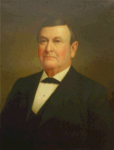| |||||||||||||||||
| |||||||||||||||||
 Cochran: 50–60% | |||||||||||||||||
| |||||||||||||||||
The 1874 Delaware gubernatorial election was held on November 3, 1874. Incumbent Democratic Governor James Ponder was unable to seek re-election. Former county judge John P. Cochran ran as the Democratic nominee to succeed Ponder and faced the Republican nominee, Dr. Isaac Jump. Cochran ultimately defeated Jump, but by a significantly reduced margin from 1870. [1]

